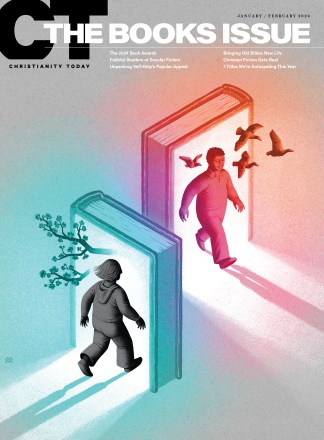This is an excerpt from A Quiet Mind to Suffer With, which was the winner in the Christian Living/Spiritual Formation category of CT’s 2024 Book Awards.
I went to the hospital because the thoughts wounded my heart and terrified my body and because they would not end. The John I met in my thoughts was bizarre and unforgivable. I saw myself doing things in my thoughts that could not be defended or explained, least of all to myself. And, it seemed, the more I tried to scrub off that John, the more he was there and the worse he was, the more bizarre, the more unmentionable.
When we got to the emergency room and told them what was wrong, they put me in a wheelchair. And took me to the place you go when they think you are a threat to yourself and others. It’s in the back and to the left.
This wheelchair, I thought, is not necessary.
I had to surrender my belongings to a man with an Afro and a smile. I put on a gown and was escorted to a room with nothing but a mattress on the floor. It was there I waited, for nurses, for experts, and for the cool breath of sanity to return to me. I told them I was having severe anxiety mixed with intrusive thoughts. I tried to make sure they understood the intrusive thoughts were things I also found disgusting, awful, and did not want to do.
When they asked me what my thoughts were, I made the mistake of telling them. Locked in an empty cell, with only a gown, you feel indebted to whoever comes in. You have nothing real to offer. And so being honest seems like the service you can provide.
I told them my thoughts and how they upset me. The nurses paused. They made sure I knew they were horrified. I’m sure the context didn’t help: sitting in a locked room with nothing but a single mattress in the corner on the floor, bare walls, and nothing on you but a little gown. Trying not to look and sound crazy when that’s exactly what you look and sound like.
They went out, came in, went out again. The hospital was packed; they were busy. They began, with their polite mouths and with that look of tired, maternal forbearance, to demand that I understand myself as insane.
They put paperwork in front of a frightened man. They said they were worried I might do something. They made it understood that if I didn’t commit myself, they would. If I was committed, it would stay with me. If I signed myself in, no one would ever know.
I thought of all the people who would not know I was in the psych ward if I just signed this sheet of paper. I saw them smiling, going about their day, never knowing I was even here. And I signed that sheet of paper.
Memory is a dangerous place. The past is humbling and scary. And remembering is an adventure done with great peril. Even as I write and rewrite these lines on my third-year anniversary of having been there, I feel not as if I am simply remembering it. What Happened lives in the body.
When I meet the Howling Boy, my own afflicted soul, my OCD jumps and tells me things about him. The Siren, my mental illness, of course never plays fair. It made that John suffer, and now it gets to tell me what his suffering means. The Siren, always so urgent and excruciating and sure of itself, says that his discouragement and dissatisfaction is intolerable, unsustainable. That his soul’s despair makes him unstable. That I could be unstable again.
I’ve taken, perhaps, a great risk in showing you this John. And have perhaps taken a great risk in seeing him myself. He may frighten you. He still frightens me: the John who is hysterical, walking the halls, wanting to cry and howl.
All of that severe discouragement. All that unbearable dissatisfaction. Feeling now what despair felt like then. But this John isn’t going anywhere. If What Happened lives in the body, the one it happened to has nowhere else to go.
I have wanted to avoid those feelings. But if I do, I lose The John Who Felt This Way. And he has nowhere else to go.
It has taken a long time, but he is welcome in my life. He has been called to a Table, to a feast, and he will receive Mercy because he is in need of it. And I have come to take him there.
And so by the shed blood of Jesus Christ I tell the Siren this:
The Howling Boy is not yours.
And he is not mine.
Because he is Christ’s.
And I say,
Memory, come back to me.
Howling Boy, come back to me.
There is Mercy here, there is Mercy here.Memory, come back to me.
Howling Boy, come back to me.
I want to see you.
There is Mercy here, there is Mercy here.Come back to me.
Come back to me.
Come back to me.I want to see you.
I want to see you.Provision has been made.
Provision has been made.
Later, my therapist helped me see it clearly: I had used thoughts as a drug, like a food addict or a drug addict. Life did not feel right, life simply was not okay, life simply could not be tolerated unless I was thinking.
Every problem in my life, everything I met, was an occasion for and was to be managed by Ceaseless Cognition. Every bad and confusing thing was a reason to think more.
And in that psych ward, I had come to that crucial place where such a thing as beautiful, primal, and necessary as thinking had begun to do me serious harm. In the way that such things as beautiful, primal, and necessary as food and medicine and sex can begin to do us serious harm.
And it turns out the only thing that now counts as hope, when you cannot think and you cannot do, the only thing that counts as power, is what you can hear. When things get that bad. Life is won, this world overcome, by being spoken to.
What I heard first, very faint, unbelievably small, was a tiny little bit of quiet that opened up in my heart. It was the kind of quiet you find yourself in when things have really and truly ended, when there’s no argument left for or against something because it’s already been decided.
The quiet after you lose the big game. The quiet at the end of a movie. The quiet after you lower the casket in the ground. The kind of thing we mean by “When all is said and done.”
There in that hallway, it was not like someone had changed the channel in my head but that someone had turned the TV off. The Realm of Ceaseless Cognition, what I call my compulsive rumination, was not dimmed or quieted but was suddenly canceled, rendered inoperable.
And I was not in the far country called the Realm of Ceaseless Cognition. And it was just me walking down the hallway with no shoes on.
I would begin to understand that quiet as the death of the Son of God. Or, rather, I began to understand that his death was my ability to be quiet, my ability to simply wait. A death that was more than my best or worst day. A death that was more than my heart.
It was just me and the hallway and this quiet.
It was the quiet where I could depend on Christ, the silence after Mercy had been spoken. Because we are not, thank God, what we can think or what we will do. We are not our thoughts and not even our wills. We are what the Word of God will make of us.
I had just found the Christ I could depend on. I had just picked up the thread of an ordinary life with Christ.
And suddenly there was something else. And it was not a word, and it was not a voice. It was an understanding in my heart that I should go to bed. And could go to bed. That I could depend on Christ by going to bed.
And I did.
I walked to the med station. A kind old nurse gave me the pill that shut off the part of my brain that made me roam the hallways crying. Within 20 minutes I felt better. And I thanked God and I went to bed.
John Andrew Bryant is a caregiver and part-time street pastor. This is an adapted excerpt from A Quiet Mind to Suffer With by John Andrew Bryant (Lexham Press, 2023). Used with permission.












